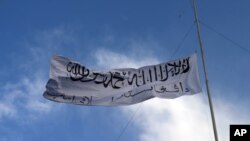I woke up with a jolt.
Was it a blast? No, just nearby construction. Everyone had been on edge for days. The Taliban’s advances across the country had been much faster than anticipated.
Senior Western sources had said it would be a couple of days before the Taliban would arrive on the doorstep of Kabul.
“Try to get out by the 19th (of August),” they said. I booked a flight for the 17th.
More than for myself, I was worried about my Afghan colleague who had been threatened by Taliban supporters on Twitter. He had applied for passports for his kids.
Trying desperately to speed up the process, he went to the passport office Sunday morning. Weekends are Thursday and Friday in Afghanistan.
He called while I was at a clinic getting tested for COVID-19 ahead of my flight.
He was breathless as he spoke: “They are throwing us out, telling us to go home. Everyone in the passport office is rushing out. The Taliban are inside Kabul."
I told him to go home then quickly tweeted the information.
As I walked out of the clinic and back to the guest house where I was staying, I saw people rushing. Everyone seemed to be in a hurry.
I learned the Taliban were not inside Kabul but on the outskirts — for now. They had issued a statement saying they did not intend to enter Kabul. With the president having left the country, the Taliban were negotiating with the government for a peaceful handover.
Twenty years after they were ousted, the Taliban had walked back victoriously and taken the capital without a shot fired.
History was in the making, so two other journalists and I went for a drive to see the mood of the city.
Panicked drivers, some driving on the wrong side of the street, caused traffic jams. News of the nearness of the Taliban had prompted offices, shops and clinics to close. The city seemed to shut down, pushing everyone onto the streets at the same time.
When our car came to a standstill, we got out and started talking to people. As the car inched along, we did this several times. There was little or no security presence on the streets, except around the airport.
Here is what people were saying:
Hamidullah, who did not want to give his last name, said people were panicking.
“I’m feeling really bad. Unfortunately, we will lose everything, the achievements of the last 20 years,” he said.
He said he had worked with the U.S. military and as an Afghan government employee and he was scared for his life.
“If Taliban control Kabul, they will try to kill me if they know about me,” he said.
Even though the Taliban had announced a general amnesty and reassured people there would be no revenge killings, their promises were not enough to assuage Hamidullah’s fears.
As part of my reporting, I checked various social media accounts to monitor how the story was developing.
The most moving tweet of the day was by Omaid Sharifi. His brainchild, an artist collective in Afghanistan called ArtLords, is famous for painting murals on the thick, gray concrete walls of Kabul, to make them look less menacing.
“We are painting a mural today-now,” he said. “It reminded me of the famous scene from @TitanicMovie, where the musicians play until the ship sinks.”
Other observations from the city Sunday were a boy in a bright orange shalwar kameez, a local dress, throwing 12-packs of water into the back of a car.
Down another street, a young man who said he studied economics claimed the government had “surrendered” Kabul to the Taliban.
Some people said they were happy with the bloodless transition.
“I was very tense this morning, but I am feeling much better now,” said one man, who did not want to be named.
Back at the guest house, the cook, the cleaner and others had tears in their eyes and tension on their faces.
One man, when asked whether he was afraid for his future, said: “It’s about staying alive right now.”




